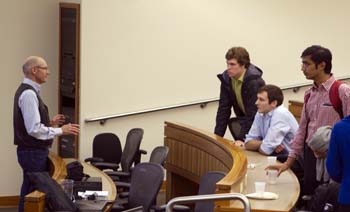 Krannert students in Patrick Johanns’s Logistics Management class are using their supply chain knowledge to help ICDI provide clean drinking water in Central Africa.
Krannert students in Patrick Johanns’s Logistics Management class are using their supply chain knowledge to help ICDI provide clean drinking water in Central Africa.
Clean drinking water is taken for granted in the United States, but not in Africa, where water-borne diseases like typhoid fever, dysentery and cholera are lethal and constant threats. “There’s a lot of problem with disease,” Jim Hocking says. “There’s just not enough clean water.”
Hocking, a former missionary, grew up in central Africa and started the nonprofit company in 2003. ICDI, which stands for Integrated Community Development International, forms long-term partnerships with communities in central Africa providing access to clean water, transformational sanitation principles and improved agricultural resources.
Because he knows the culture, Hocking is able to communicate effectively with village leaders, gain local support, then educate and empower native people so they can maintain a municipal well, the first step toward long-term community development. The well drilling and maintenance program now provides clean water for 1/2-million people.
Although Hocking says ICDI is already very cost-effective – “You can give $1 and it will provide one African water for one year,” – it is looking for additional efficiencies and best practices to make donated funds go further. That’s where Krannert students come in.
Steve Betulius, who is a member of both the ICDI Board of Directors and the Krannert School Alumni Association Board of Directors, helped arrange for Hocking to speak at the Krannert Executive Forum in August. While on campus for the forum, Hocking connected with Johanns, a continuing term lecturer at Krannert, who had just started teaching a fall semester Logistics Management class.
Johanns incorporated the ICDI supply chain and maintenance issues into a classroom project. “I think you get more intimately involved when it’s a real problem involving real people.” Although his students were able to ask questions via video conference, “in the real world you don’t always get all the data you want,” he says, making the project that much more challenging and realistic.
Because of the company’s location in the world, there are supply chain and logistics issues beyond what most students could imagine, Johanns says. The Central African Republic is about the same size as Texas, but only has 500 miles of paved roads. In addition, the eastern part of the country is not safe for travel. Cell phone coverage is lacking in certain areas.
Krannert students made end-of-semester presentations to the company with recommendations on how to improve data collection, vehicle maintenance and supply chain issues. “The suggestions the students gave truly have a chance of improving things. They gave a lot of good, practical suggestions,” Johanns says.
Students also gained insight from the exercise. “Initially it was really different,” says student Richard Strom, “because, you’re dealing with so many out-of-the-ordinary things compared to ordinary supply chain problems. You have to take into consideration the geo-political conditions.”
The collaboration between ICDI and Krannert doesn’t end now that student recommendations have been made. “We were very intrigued by some of the students' creative proposals and are currently discussing incorporating at least two of the suggestions into our 2013 operations,” Betulius says.
”As we continue this partnership, we hope to arrange for a team of students to travel to the CAR for a firsthand experience. It would be a way to expand upon the social innovation activities of Krannert, enable students to see how their ideas have been implemented and encourage innovative ways to further our mission to provide, equip and empower the people of the Central African Republic.”

